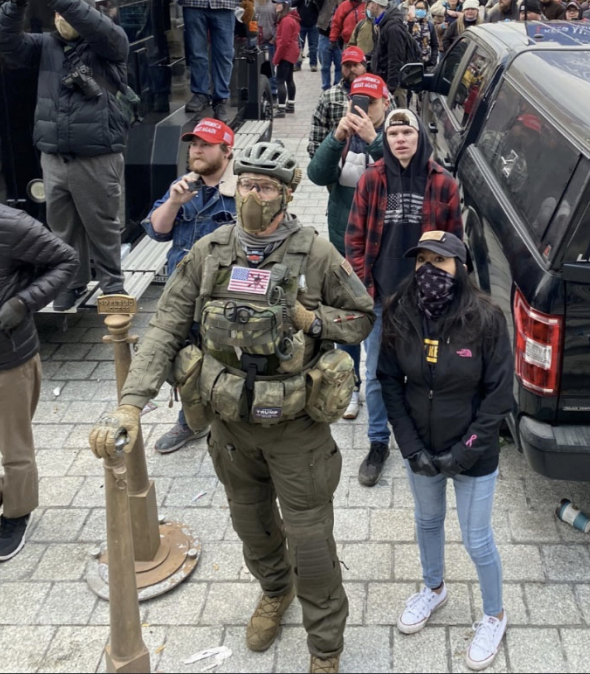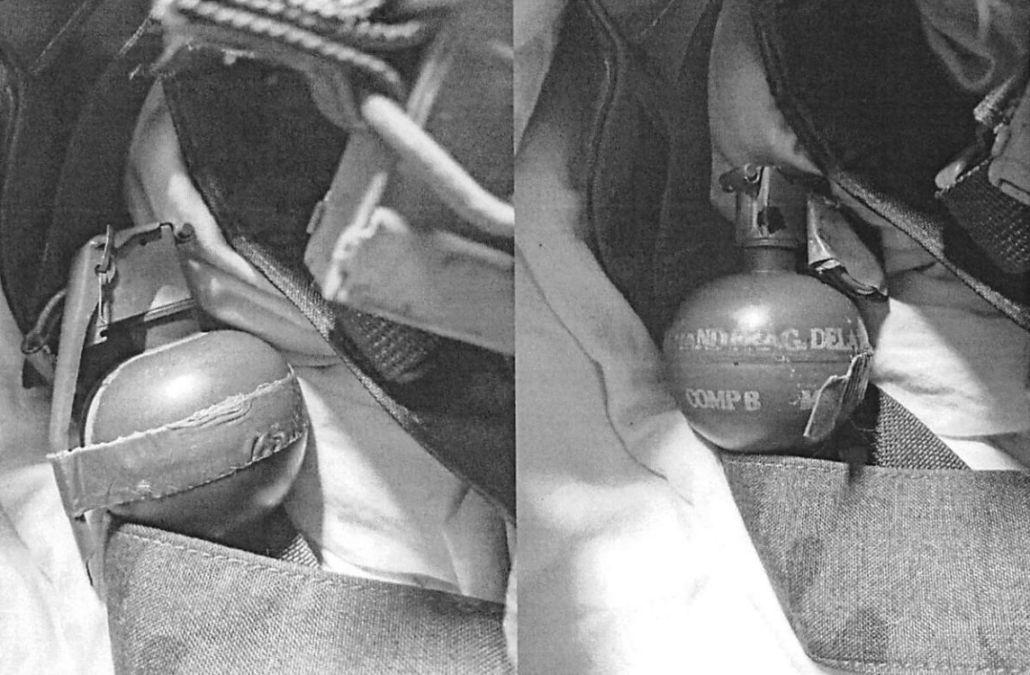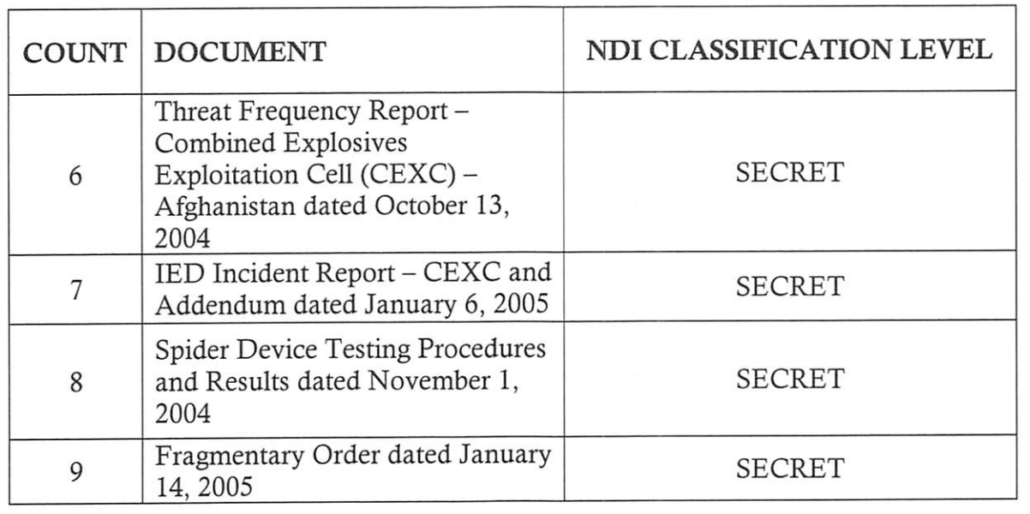DOJ Raises Prospect that Trump Continues to Obstruct Investigation, Including of Empty Folders
DOJ submitted its reply in its request for the 11th Circuit to stay parts of Aileen Cannon’s order pertaining to documents marked classified. The matter is fully briefed, so the 11 Circuit could rule at any time.
There’s little that’s new in the reply, except for DOJ’s response to Trump’s claim that the 11th Circuit cannot hear an interlocutory appeal as to whether DOJ has to share the classified files with Judge Raymond Dearie and Trump’s lawyers. The government cites three bases for appeal: a claim that they are appealing Cannon’s initial order on September 5 stating she would appoint a Special Master, an assertion that an order to share classified information would be appealable by itself, and if all that fails, a writ of mandamus.
2 If the Court harbors any doubts about its jurisdiction over portions of the September 5 order, it should construe the government’s appeal and stay motion as a petition for a writ of mandamus with respect to those portions and grant the petition. See SuarezValdez v. Shearson Leahman/American Express, Inc., 858 F.2d 648, 649 (11th Cir. 1988).
This jurisdictional dispute is, in my opinion, getting too little attention, because it’s one way Trump could succeed even though all the facts are against him. That said, as the government suggested, they believe they could separately appeal the order to share information (and so they could just turn around and file another appeal to address that order). Moreover, in yesterday’s hearing, Dearie indicated that, absent any affirmative claim that Trump has declassified any documents, he would resolve that issue without looking at the documents. (See also Adam Klasfeld’s report on the hearing.)
DOJ also points to Trump’s proposed topics for yesterday’s hearing to note that he refuses to say that he declassified any of the documents at issue (and that he’s already seeking to draw out this process).
Plaintiff again implies that he could have declassified the records before leaving office. As before, however, Plaintiff conspicuously fails to represent, much less show, that he actually took that step. And Plaintiff is now resisting the special master’s proposal that he identify any records he claims to have declassified and substantiate those claims with evidence. D.E. 97 at 2-3.
[snip]
To the contrary, after persuading the district court to grant injunctive relief and appoint a special master to adjudicate purportedly “disputed issues” about the records’ status, A6-A7, Plaintiff has now reversed course: In response to the special master’s invitation to identify any records he claims to have declassified and offer evidence to support such claims, Plaintiff objected to “disclos[ing] specific information regarding declassification to the Court and to the Government.” D.E. 97 at 2.
The timing of these filings serves the government’s case well, because Trump is refusing to make the kind of affirmative claims that a plaintiff would need to make for relief (though with another day, DOJ could have relied upon a transcript of the Dearie hearing as well, in which Jim Trusty asserted that with his Top Secret — but not SCI — clearance he should not be denied the Need to Know to access the documents).
The ease with which DOJ rebutted Trump’s factual claims is downright funny in places (or would be, if not for the possibility that some nutjob panel on the 11th won’t see the humor). For example, DOJ noted what I did — Trump invoked notes he had written on documents to claim Executive Privilege over some of the documents with classification marks. But those were documents turned over in June, not documents seized in August.
Indeed, except for a brief footnote, his response does not mention executive privilege at all. And the footnote states only that other classified documents recovered before the search contained Plaintiff’s handwritten notes and that those notes “could” contain privileged information. Resp. 13 n.5; see A73. But the question is not whether the records at issue here might contain material that in other circumstances could give rise to valid claims of executive privilege against disclosure to Congress or the public. Instead, it is whether Plaintiff can assert the privilege to prevent the Executive Branch itself from reviewing records that are central to its investigation.
DOJ doesn’t note here that these were documents turned over in response to a subpoena, but elsewhere, it notes that he didn’t raise such privilege claims when he turned over the records.
Plaintiff should not be heard to assert a privilege that he failed to raise in response to a grand-jury subpoena.
In other words, Trump is relying on documents that he turned over with no privilege claim to suggest he might withhold documents based on an Executive Privilege claim.
DOJ similarly notes that Trump pointed to a portion of the seized materials he might own as his basis for a claim DOJ shouldn’t have access to files he cannot own.
Plaintiff asserts (at 10) that he owns other seized evidence, such as “personal effects.” He may well have standing to seek return of that “portion” of the seized evidence. United States v. Melquiades, 394 Fed. Appx. 578, 584 (11th Cir. 2010). But he cites no authority supporting a claim for return of records that do not belong to him.
Both these areas are where Trump is stuck trying to make Cannon’s gimmicks to justify intervening hold up under scrutiny.
I’m most interested in how DOJ repeats something it has already said. It asserted that it may need to use additional search warrants to hunt down any files disclosed to others.
As the government explained—and as supported by a sworn declaration from the Assistant Director for the FBI’s Counterintelligence Division—the Intelligence Community’s (IC’s) classification review and national-security assessment cannot uncover the full set of facts needed to understand which if any records bearing classification markings were disclosed, to whom, and in what circumstances. Mot. 18; A41-A42. The FBI has a critical role in using criminal investigative tools such as witness interviews, subpoenas, and search warrants in pursuit of these facts. A42. The injunction bars the FBI from using the seized records bearing classification markings to do just that. Plaintiff asserts that the government has shown only “that it would be easier . . . to conduct the criminal investigation and national security assessment in tandem.” Resp. 17. But the injunction prohibits DOJ and the FBI from taking these investigative steps unless they are “inextricable” from what the court referred to as the IC’s “Security Assessments,” A11-A12—a standard that the government must discern on pain of contempt.
Plaintiff next dismisses the government’s national-security concerns as “hypothetical.” Resp. 17 (citing A11). But the injunction is preventing the government from taking some of the steps necessary to determine whether those concerns have or may become a reality. Moreover, Plaintiff fails to address the harms caused by the injunction’s interference in the expeditious administration of the criminal laws, and by the possibility that the government’s law-enforcement efforts will be obstructed (or perhaps further obstructed). Mot. 19-20. Plaintiff states only that the injunction will last for a “short period,” Resp. 19. At the same time, Plaintiff is already attempting to delay proceedings before the special master. See D.E. 97 at 1-2 (seeking to extend deadlines and set hearings “on any Rule 41 or related filings” in “Late November”). [my emphasis]
As noted, DOJ made this argument — relying on Alan Kohler’s declaration, the only sworn declaration in the docket — in its motion for a stay before Cannon. But when they suggested that Trump may have leaked documents in their initial filing before the 11th, they only mentioned compulsory process, not warrants specifically.
For example, the court’s injunction bars the government from “using the content of the documents to conduct witness interviews.” A9. The injunction also appears to bar the FBI and DOJ from further reviewing the records to discern any patterns in the types of records that were retained, which could lead to identification of other records still missing. See A42 (describing recovery of “empty folders with ‘classified’ banners”). And the injunction would prohibit the government from using any aspect of the seized records’ contents to support the use of compulsory process to locate any additional records.
This is all couched in the language of hypothetical possibilities. DOJ is not saying that they currently have plans to execute further warrants in search of the documents Trump stole and, possibly, leaked to others.
But they are suggesting that may be a step they would take — before such time as the Special Master process ends in November — to try to hunt down the contents that used to be in those empty folders or other files Trump leaked to people not cleared to have them.
Christina Bobb, whom (according to the NYT) investigators already asked to interview, amended the declaration that Evan Corcoran wrote, possibly to limit her own certification to files still at Mar-a-Lago. If DOJ has since learned why that declaration did not incorporate all documents in Trump’s possession — something that has been a focus for weeks — the injunction really might be preventing further action, including search warrants to get them back.
Go to emptywheel resource page on Trump Espionage Investigation.


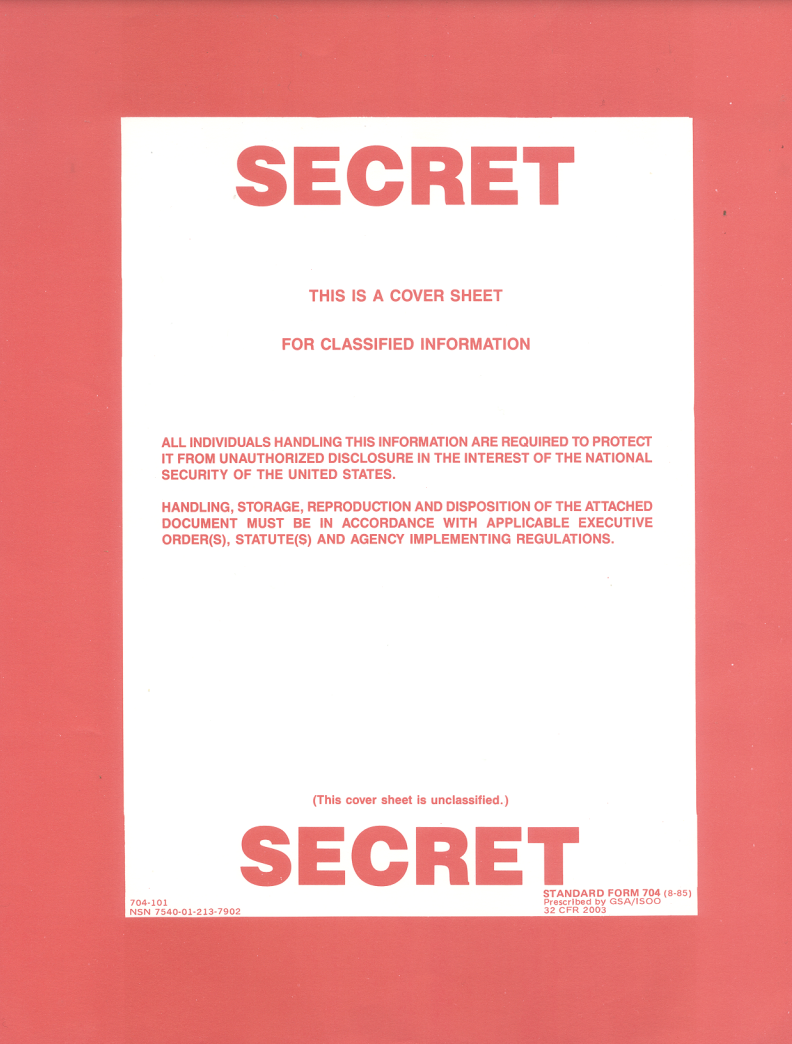
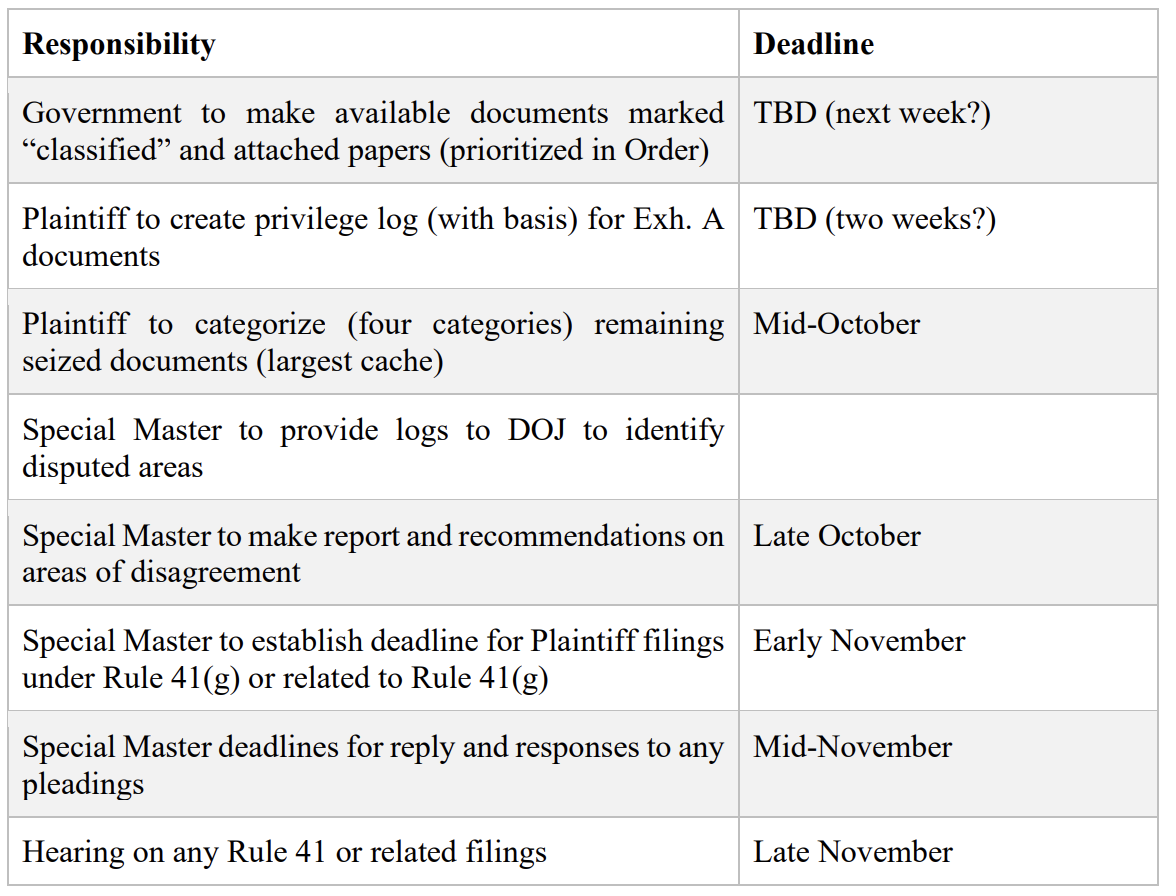

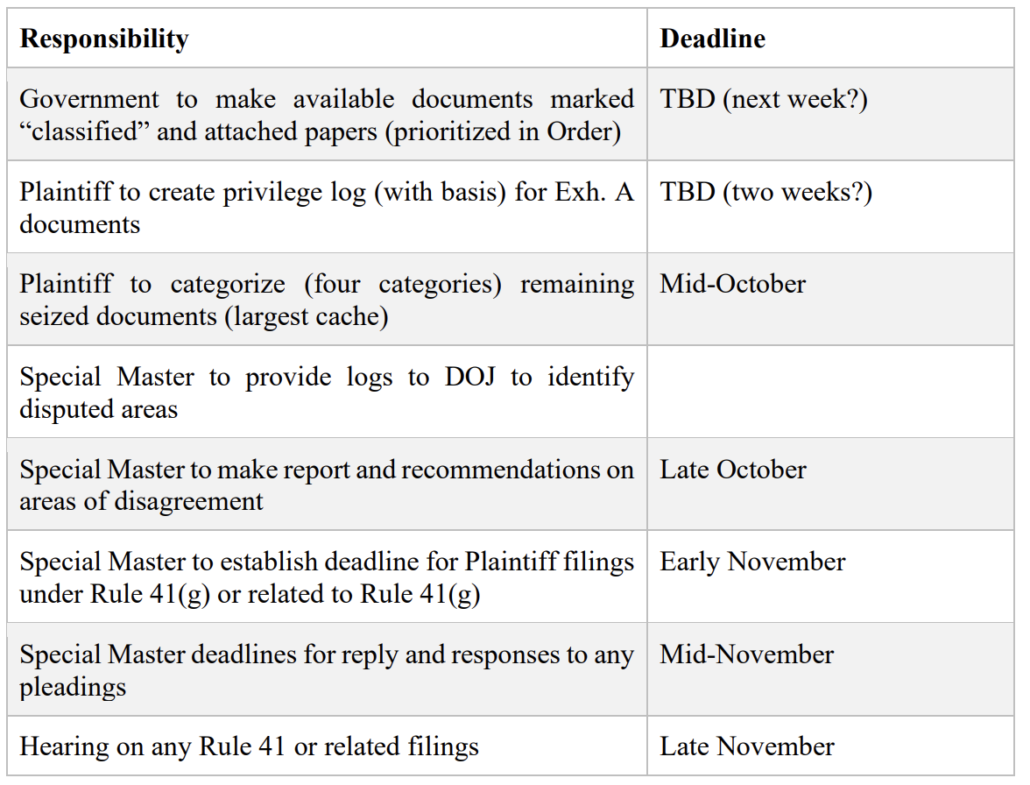
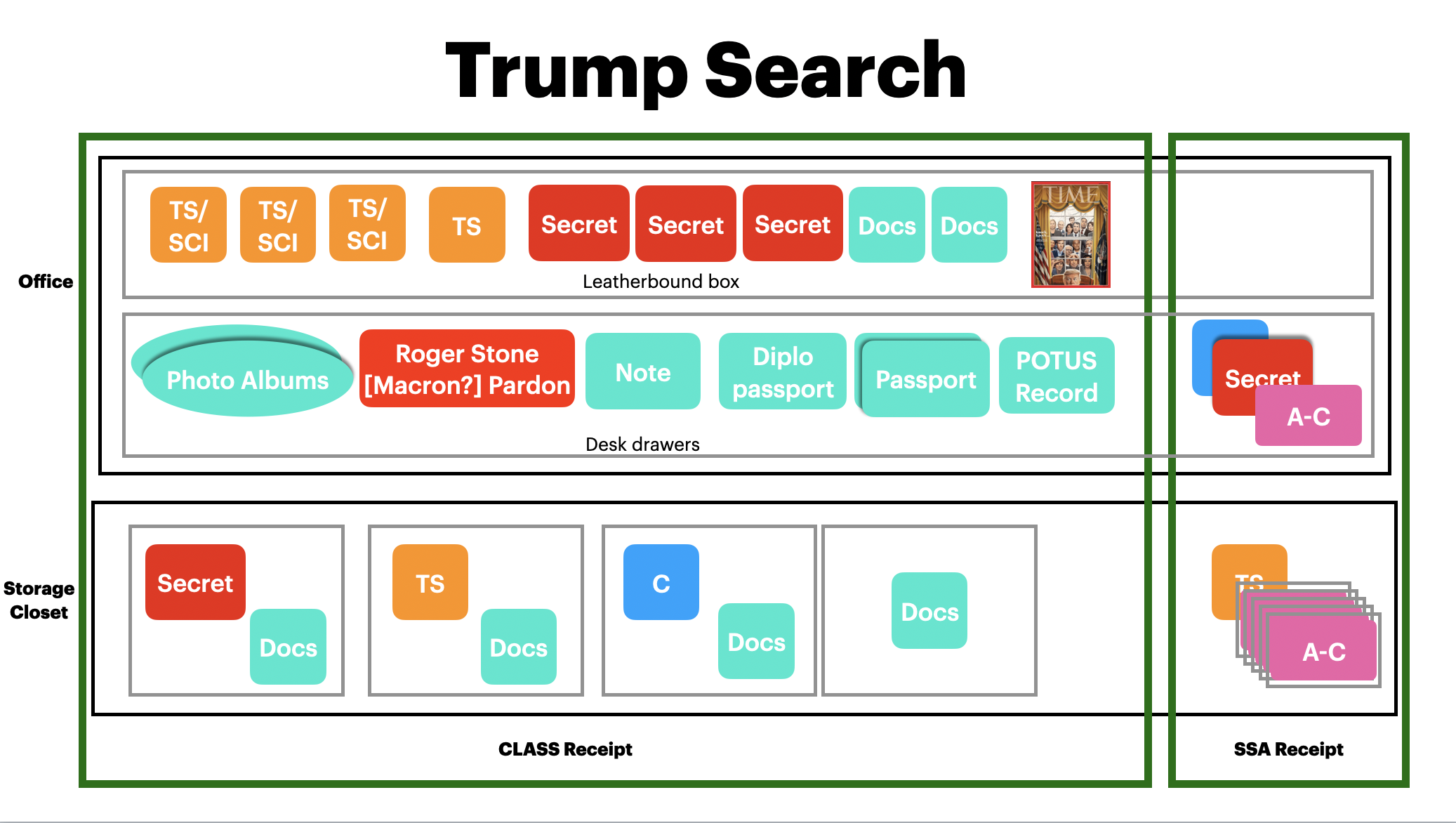
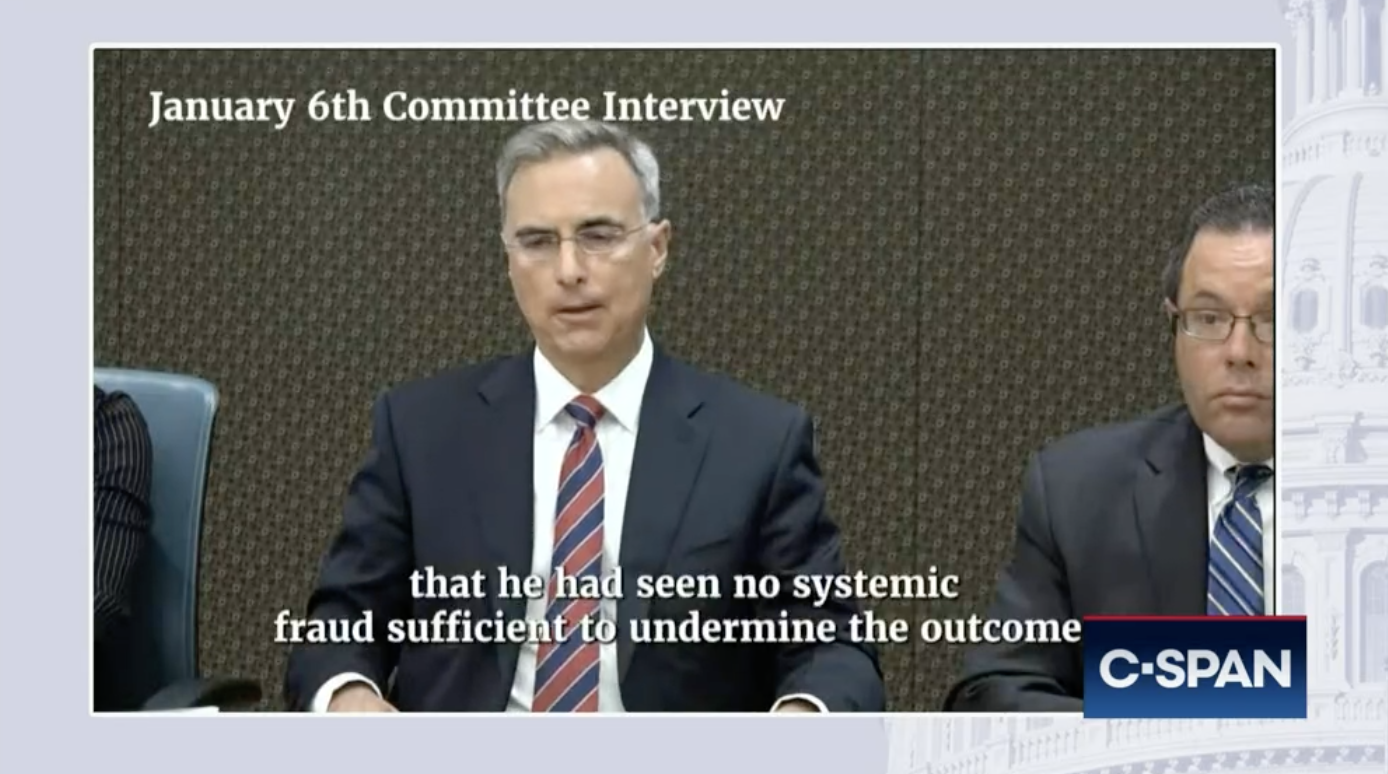
![[Photo: National Security Agency, Ft. Meade, MD via Wikimedia]](https://www.emptywheel.net/wp-content/uploads/2017/08/NationalSecurityAgency_HQ-FortMeadeMD_Wikimedia.jpg)
